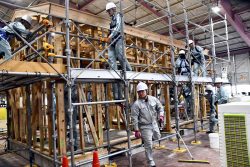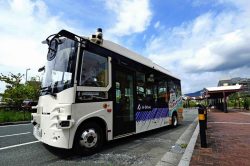Leaders: Satoshi Onoda, President, Representative Director, JERA Co., Inc. / Aiming to achieve high-efficiency thermal power generation toward decarbonization
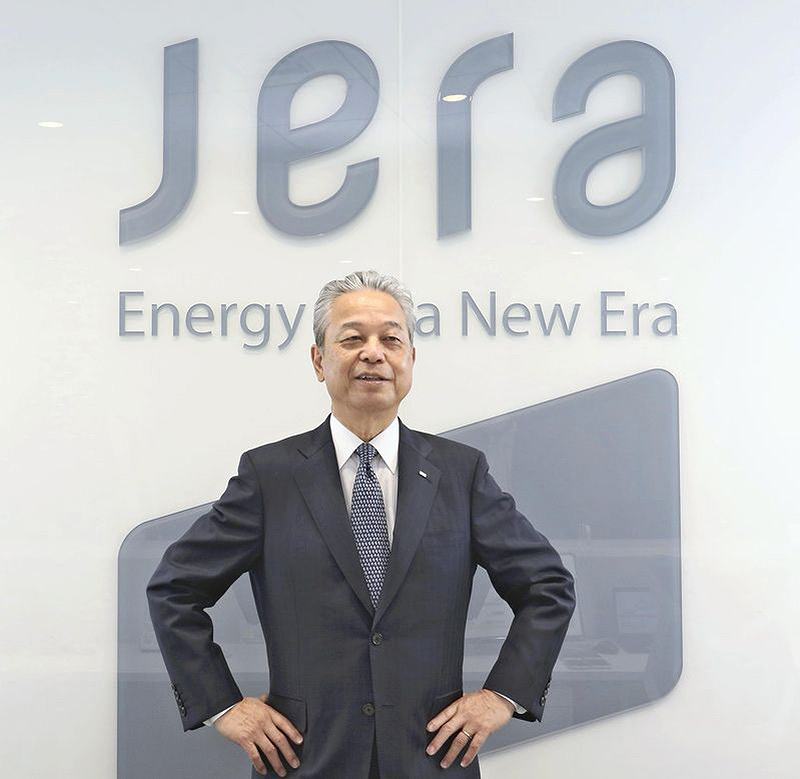
Satoshi Onoda, President, Representative Director, JERA Co., Inc.
10:33 JST, December 18, 2021
JERA Co., Inc. is a joint venture between Tokyo Electric Power Company Holdings and Chubu Electric Power Co., and the country’s largest power company. JERA President and Representative Director Satoshi Onoda, 66, talked about the company’s efforts to achieve stable power supply and decarbonization.
JERA has 27 thermal power plants across the country, including those under construction. Seventy percent of electricity generated at these plants is from liquefied natural gas (LNG), and half of the rest is from coal while the other half is from petroleum.
Onoda: LNG produces relatively less carbon dioxide (CO2) when burned, and China and other countries now import large amounts of LNG. Prices for LNG are surging, and I believe the current situation will continue for a while.
Storing LNG for a long time is difficult because it vaporizes, among other reasons. In order to stably supply electricity at the lowest possible price, it is necessary to carefully watch the demand for fuel for power generation and price trends and procure fuel at an appropriate timing.
So far, we have received demand forecasts from electric power retailers to whom we sell electricity. This year, we started trying to forecast the demand on our own. We would like to increase the accuracy by making use of the sales data we have accumulated so far.
Our company handles about 40 million tons of LNG each year, which is the largest amount in the world, and has a network with many businesses. We have a trading center in Singapore and procure LNG while taking into account international circumstances.
Renewable sources are insufficient to satisfy demand. On the other hand, too much reliance on LNG could lead to further price increases. While many are critical of coal because it produces a large amount of CO2, using coal in a balanced manner is a realistic way to ensure a stable supply of electricity.
Of course, we have to reduce CO2 emissions as much as possible. At present, we are planning two coal-fired power plants, where we will introduce cutting-edge technologies to burn coal highly efficiently. At the same time, we will stop operating old facilities.
In October last year, JERA announced the JERA Zero Emission 2050 initiative, under which the company aims to reduce CO2 emissions from its domestic and overseas businesses to net zero by 2050.
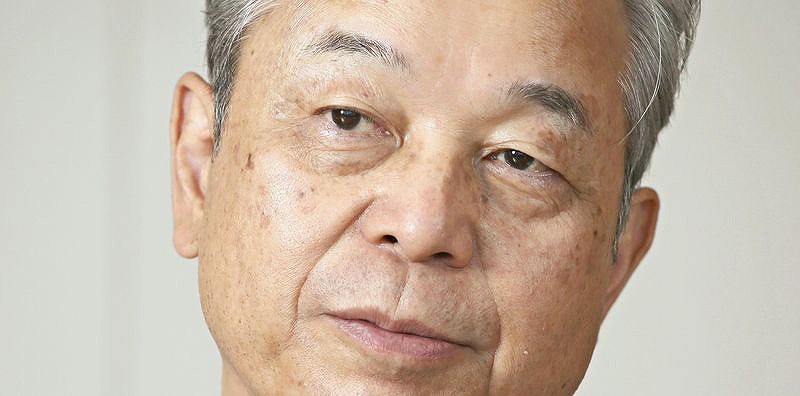
Satoshi Onoda
Onoda: One of our specific measures is to use ammonia. We have started a demonstration experiment to use ammonia as part of fuel at a coal-fired power plant in Aichi Prefecture. We plan to gradually increase the proportion of ammonia while improving the facility. There is no major technical problem, while procurement will be a big hurdle. If we raise the proportion of ammonia burned with coal in two boilers to 20%, we will need 1 million tons of ammonia to operate the boilers per year, the amount equal to the total currently used for fertilizers and industrial purposes in Japan. Low-cost production and development of a global supply network would be necessary. JERA is involved in all processes from LNG development to power generation, so we can make use of the knowledge and know-how on ammonia.
In addition, we are also considering burning hydrogen at an LNG thermal power plant and discussing that with a plant maker at the moment. We will increase the proportion of hydrogen in a phased manner.
Our company was created by integrating thermal power generation units of TEPCO and Chubu Electric Power, so employees have pride in the fact that they have been supporting electricity supply in the country for many years. If we aim for zero CO2 emissions, I thought it would sound like we will abolish thermal power generation. However, if we burn ammonia and hydrogen with traditional fuels, we will be able to make use of our current technologies.
Around the same time when we announced the zero-emissions plan, the government unveiled its goal of reducing CO2 emissions to net zero by 2050, which provided momentum for decarbonization. I think it is significant that the whole country started to move in the same direction.
To promote the introduction of renewable sources, we are involved in large-scale wind power projects in Britain and Taiwan to accumulate know-how in the field. We aim to participate in a planned off-shore wind-power project off Akita Prefecture.
While many renewable sources are affected by weather, we can stably use them if we can store electricity. We are trying to recycle used batteries for electric vehicles and use them to balance power supply and demand.
We are not just working on domestic measures. In the Asia region, it is expected that the use of fossil fuels will increase to support economic growth, so decarbonization technologies will be needed. There are many things we can help with, and recently we have decided to invest in a major power company in the Philippines.
Our missions is “to provide cutting edge solutions to the world’s energy issues.” We hope to grow together with Asian countries and regions.
Onoda joined Chubu Electric Power in 1980 as a thermal power generation engineer after he graduated from a graduate school.
Onoda: I am from Aichi Prefecture, and I wanted to work in an industry familiar to our lives.
When Japan was moving into the bubble economy, there were a number of plans to construct power plants, and I was involved in the construction of facilities to receive LNG and other buildings. As the bubble burst and the economy collapsed, the situation completely changed and many power plants were no longer needed. Around that time, the electricity retail market was deregulated, which allowed us to embark on various businesses. So, we decided to sell LNG.
In 2000, we established a company called LNG Chubu Corporation, first staffed with five employees, including myself. At that time, the domestic electricity market was a regional monopoly, so we were able to sell electricity without making efforts. However, when we tried to sell LNG, we had to compete with petroleum or propane gas retailers. Unless we presented the advantages of LNG, no one would buy it.
I was thinking while in bed how to explain the advantages, and I came up with certain ideas when I woke up. I went to the office early and made some proposals. Even so, I could not win a contract, and then I thought about it again. This continued for a while.
We were not able to sell LNG for three years and almost gave up the project. Around that time, we finally won a long-term contract. We made a small decorative banner that dropped from the ceiling and held a small party to celebrate. All employees there cried. We should try everything, and if one way does not work, then try another. That was a precious experience that still helps me today.
In 2011, the Great East Japan Earthquake occurred, followed by the nuclear accident at the Fukushima No. 1 nuclear power plant. With the electricity system reform progressing, there was a growing call for an energy company with international competitiveness. For that, JERA was established in 2015. The integration work was done in a phased manner and completed in 2019.
Onoda: After the earthquake, I served as an executive director for the Federation of Electric Power Companies of Japan, an industry organization, and other posts. I was not deeply involved in the establishment of JERA. When a new management system was launched in 2019, I was asked to become the president of the company, which was surprising to me, to be honest. However, I wanted to value the feelings of employees who have been involved in thermal power generation and bring them together,.
My favorite word is “pride.” I encourage employees to always enhance their own skills and be proud of their work.
Kyudo Japanese archery
Onoda joined the Kyudo Japanese archery club when he was a high school student because he thought it was cool. During his university days, he stopped doing it. However, he again had contact with the sport three years after he joined Chubu Electric Power. Since then, he has been visiting a kyudo hall for practice. He has sixth dan in kyudo. To hit the target 28 meters away with the arrow, it is important to eliminate distractions and concentrate, which he says is also the case with work.
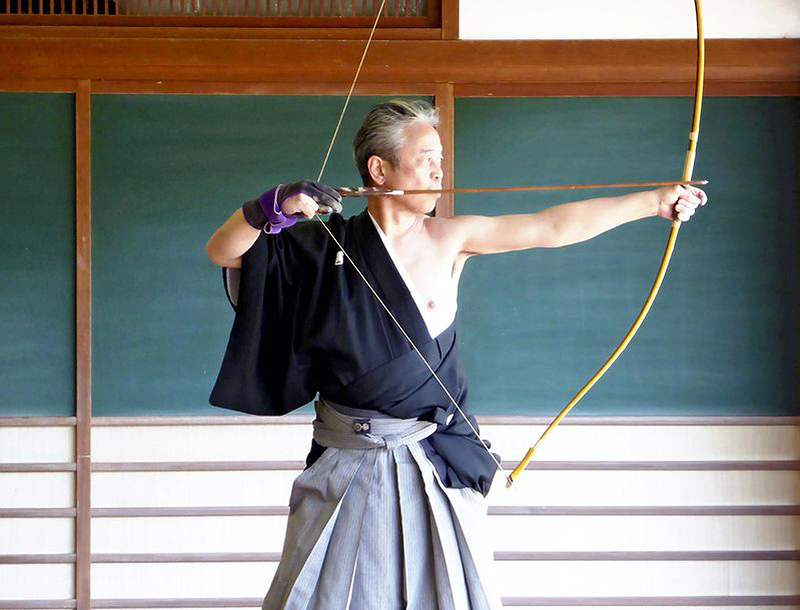
Satoshi Onoda have sixth dan in kyudo.
Numbers: Zero
The JERA Zero Emission 2050 initiative includes a road map toward net-zero CO2 emissions by 2050 in Japan. He plans to create such road maps for countries and regions in Asia according to their respective circumstances and cooperate with stakeholders around the world.
Satoshi Onoda
Onoda was born in 1955 in Aichi Prefecture. He graduated from Keio University’s Graduate School of Science and Technology and joined Chubu Electric Power in 1980. He served as the senior managing executive officer and the head of the power-generation business headquarters. In 2018, he was promoted to executive vice president. He has been in his current position since April 2019.
Top Articles in Business
-

Prudential Life Insurance Plans to Fully Compensate for Damages Caused by Fraudulent Actions Without Waiting for Third-Party Committee Review
-

Narita Airport, Startup in Japan Demonstrate Machine to Compress Clothes for Tourists to Prevent People from Abandoning Suitcases
-

Japan, U.S. Name 3 Inaugural Investment Projects; Reached Agreement After Considerable Difficulty
-

JR Tokai, Shizuoka Pref. Agree on Water Resources for Maglev Train Construction
-

Toyota Motor Group Firm to Sell Clean Energy Greenhouses for Strawberries
JN ACCESS RANKING
-

Japan PM Takaichi’s Cabinet Resigns en Masse
-

Japan Institute to Use Domestic Commercial Optical Lattice Clock to Set Japan Standard Time
-

Israeli Ambassador to Japan Speaks about Japan’s Role in the Reconstruction of Gaza
-

Man Infected with Measles Reportedly Dined at Restaurant in Tokyo Station
-

Videos Plagiarized, Reposted with False Subtitles Claiming ‘Ryukyu Belongs to China’; Anti-China False Information Also Posted in Japan


